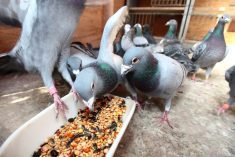Veterinary officials in Alberta are now investigating the province’s first-ever outbreak of porcine epidemic diarrhea (PED) in hogs.
Alberta Pork, the province’s hog producer commission, and the provincial government on Tuesday announced an outbreak of the viral disease at what was described as a “400-head hog operation.”
Javier Bahamon, quality assurance and production manager for Alberta Pork, told Alberta Farmer on Tuesday that the outbreak was discovered last Thursday (Jan. 3) on a farrow-to-finish operation and was reported to the provincial ag department by a private veterinarian.
Read Also

Trump tariff on Brazilian goods could jack up U.S. burger price
U.S. President Donald Trump’s plan for a 50 per cent tariff on goods from Brazil will likely raise prices for the beef that is used in American hamburgers, traders and analysts said on Thursday, as food manufacturers increasingly rely on imports during a time of declining domestic production.
The barn in question has been “contained,” he said, and other producers in the area have been notified. No other information was immediately available Tuesday on the general location of the property.
The porcine epidemic diarrhea virus (PEDv) is a coronavirus which, once introduced in a herd, causes vomiting, watery diarrhea and dehydration in infected animals. Mortality rates run up to 100 per cent in infected nursing-age piglets but are much lower in growing hogs, which generally present with milder diarrhea.
Alberta Pork emphasized in a release Tuesday the disease poses no risk to people or other animals and pork products remain safe for consumption.
The provincial ag ministry said in a separate statement it doesn’t expect to see any “market access implications” for Alberta hogs or pork as a result of the new finding.
All that said, “any sudden onset of unusual diarrhea should be investigated immediately by a veterinarian,” the province said.
PEDv is known to spread via the “fecal-oral” route, most commonly through infected feces coming onto farms on “various surfaces” that can carry and transmit the virus, Alberta Pork said.
Biosecurity protocols are of “utmost importance” to curb further impact, Alberta Pork said. “It is especially critical during this outbreak that producers consider enhancing biosecurity on-farm and in animal transportation.”
Producers “are encouraged to submit all swine manifests, including farm-to-farm movements, in a timely manner” and off-farm destinations such as abattoirs “should be considered as a potential source for bringing disease to your herd.”
Alberta had guarded its PED-free status since before the disease first appeared in the Canadian hog herd, on a hog farm in southern Ontario in early 2014. The disease was confirmed in the U.S. in May 2013 and Alberta declared PED a provincially reportable disease the following Jan. 20.
Alberta’s surveillance turned up an environmental sample of PEDv in an “office space” at a hog handling facility later that fall, but the disease hadn’t appeared in hogs anywhere in Alberta until now.
Since the disease’s first appearance there, Ontario has confirmed outbreaks at 117 hog farms, most recently on Dec. 20, 2018 at a farrow-to-weaning operation in Perth County.
PEDv also turned up in hogs in Manitoba in 2014 and has appeared in 107 on-farm outbreaks in Manitoba, nearly all in the province’s southeast, most recently at a finisher barn on Dec. 28, 2018.
Quebec has reported 16 outbreaks since 2014, most recently in the Centre-du-Quebec region in April 2015 but mainly in the Monteregie. Prince Edward Island reported one outbreak in 2015. Saskatchewan has turned up environmental samples of PEDv, but no cases in hogs to date. — Glacier FarmMedia Network















